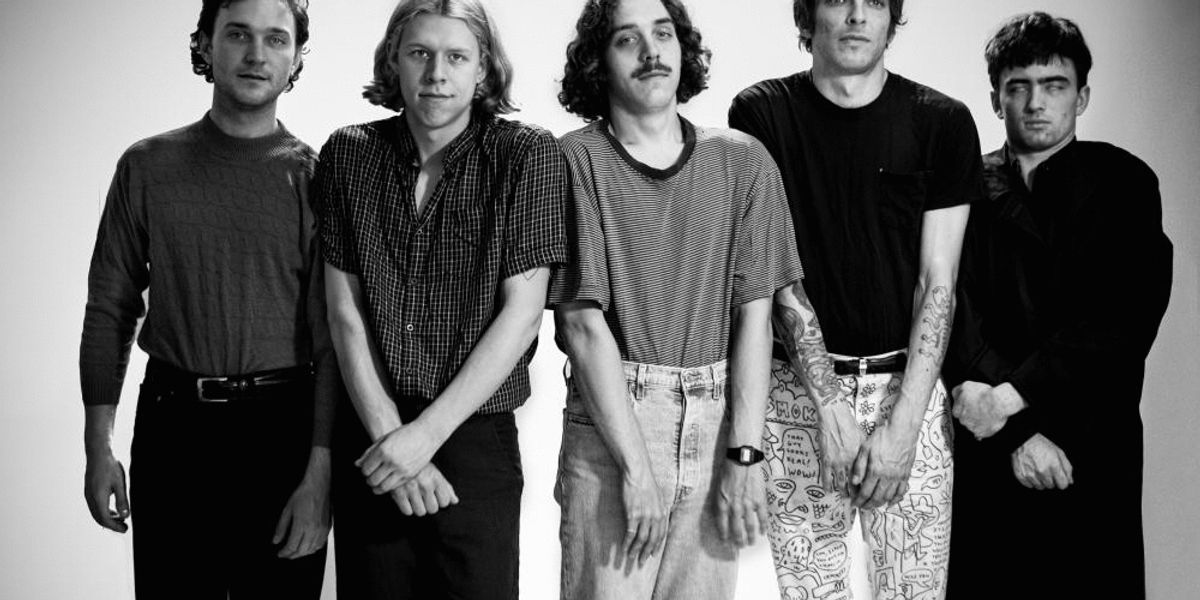Before we even consider Montreal five-piece Pottery’s musical exploits on their debut album, the elephant in the room must be addressed. Who is Bobby, and why should I care about his motel? Bobby’s Motel, according to the band, is an alternate reality crafted from the collective and absurd consciousness of the band. Bobby himself cannot be better described than in the Pottery’s own words; “Bobby is a pilot, a lumberjack, a stay at home dad, and a disco dancer that never rips his pants. He’s a punching bag filled with comic relief. He laughs in the face of day-to-day ambiguity, as worrying isn’t worth it to Bobby.”
Excellent, so this is a concept album… or is it. Trying to find a consistent theme or plotline throughout Welcome to Bobby’s Motel is nigh on impossible. The band are remarkably economical with their lyricism, and the album is built on beguilement and non-sequiturs. I suppose Pottery’s debut is a concept album so long as the concept is “there is no concept, and everything is absurd”. Putting all of this preamble to one side, what needs to be said is that Pottery’s debut is a fascinating album and one steeped in musicality and musical history.
To get an insight into Pottery’s World (or maybe Bobby’s World?) listen to the album’s lead single “Texas Drums Part I” along with the similarly absurd and dream-like music video. This track shows the characteristics of Pottery; a funk so funky it dances itself into a chaotic panic; limited lyricism that still seems to hit the mark and punctuate straight into your insecurity; and a witty irreverence that excitedly leads you down many a dark and unexpected alleyway. On the album “Texas Drums” is expanded into a six-minute journey into the unknown. Added to the most accessible half, already released as a single, are twists and turns into some of the most experimental moments on the album. Part II begins sounding like a Giorgio Moroder electronic disco classic and quickly shifts to a dark distorted disco, reminiscent of Fat White Family’s 2019 release Serfs Up, mixed with the auxiliary percussion and polyrhythm you would expect to hear on a Fela Kuti jam.
Pottery wears their influences on their sleeve; flavors of post-punk royalty are frequent throughout the album. Along with Talking Heads, Gang of Four, the Pop Group, Devo, and the Birthday Present, among others, can all be heard living in the new musical experiments on this furiously frenetic debut. Clearly, the band have a lot of respect for post-punk and the epoch’s lasting influence. More than just a melting pot of influences forced together, Welcome to Bobby’s Hotel will switch on a dime from a more balladic Orange Juice infused track (“Hot Like Jungle”) to a raucous Birthday Present imbued shout (“NY Inn”). Like post-punk, Pottery’s style has links that stretch further afield. More hard rock and metal sensibilities are married with a softer, more mellow aesthetic on “Reflection”. Surf music and 1960s rock ‘n’ roll creep in on “Texas Drums, Pt. I & 2” with it swooning electric guitars and the B-52s influence in style and delivery.
The polyrhythmic and infectious sounds of Afrobeat can be heard throughout the album, but they are at their most potent on “Hot Heater”. Short staccato 16th notes, repeated chants, and heavily syncopated drum beats make this track a real hip mover. Although David Byrne and Talking Heads were also influenced by Afrobeat and African drumming, Pottery have placed their mark on post-punk-Afrobeat fusion — their sound as much their own as it is similar to Talking Heads.
Welcome to Bobby’s Motel is bursting at the seams with intrigue and absurdity. Jam-packed with such strong and vibrant flavors, the album is not a taste you can forget. Pottery pulls through on all of their promise of combined art-pop acid trips and anarchic dancefloor funk. With their eclectic debut, Porridge has firmly placed themselves on the map as they confidently look for the artistic stardom of their post-punk idols.


